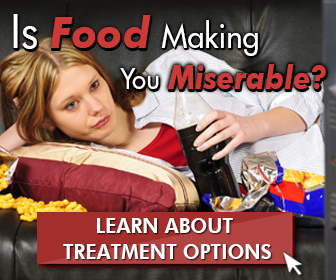Mounting evidence shows that food addiction may be the culprit for disorders such as compulsive over-eating, binge-eating disorder and bulimia. Fortunately, this new understanding has made way for highly sophisticated and effective treatment.

Sharelines
When people think of addiction, what usually comes to mind are addictions to substances like drugs and alcohol, but a growing body of evidence has revealed that eating can be just as addictive.
While it may seem odd to consider that one could become addicted to one of the basic necessities of life, numerous studies have demonstrated that compulsive eating, often in the form of binge-eating disorder and bulimia, shows remarkable similarities to substance addiction. For many sufferers, this complex disorder often requires professional food addiction treatment to overcome.
Binge Eating and the Brain
The brain’s reward pathway, or pleasure centre, plays an important role in motivating the behaviours necessary for survival. Feel-good chemicals like dopamine are released in response to natural stimuli including food, sex and social interaction. This system ensures that, on the most basic human level, you are motivated to do the things necessary for survival.
This same system, however, is the biological basis of food addiction – pleasurable feelings associated with certain behaviours compel you to repeatedly consume the substance or perform an action to achieve the desired effect. In the case of food addiction, the brain is especially responsive to foods containing high levels of sugar, fats and salt, making the prevalence of junk food in society a huge contributing factor.
Eating Disorders, Depression and Anxiety
Individuals suffering from food addictions like bulimia or binge-eating disorder have been found to exhibit high rates of co-occurring disorders such as depression and anxiety. These conditions can make an addiction far more persistent and susceptible to relapse.
For example, some suffering from depression may reach for food for a quick fix of dopamine to relieve the unpleasantness caused by their psychological state. Giving in to this compulsion to overeat may result in feelings of shame or guilt, compelling them to turn to food for comfort, thus restarting the cycle.
Even after successful treatment of food addiction, these underlying psychological issues may resurface, which is why it is so important to treat eating disorders and mental wellness issues simultaneously.
Are You Addicted to Food?
Food addiction is not simply a tendency to overindulge in junk food or treats every once in a while. It is a debilitating condition that causes significant distress to those affected. People suffering from food addiction cannot stop their compulsive eating behaviour even when faced with negative consequences. These can include obesity, diabetes, high blood pressure, damage to social relationships and feeling extreme shame or guilt.
Additionally, not all individuals suffering from food addiction are overweight – many people compensate for overeating with behaviours like excessive exercise, fasting or self-induced vomiting (purging).
Some signs of food addiction are:
- Hiding eating habits from friends and family
- Eating in secret or at unusual times, such as in the middle of the night
- Finding yourself consumed by thoughts of what and when you will eat next
- Eating even when you are not hungry, sometimes to the point of feeling ill
- Feeling a total loss of control when eating certain foods
- Repeated failed efforts to manage bingeing or purging behaviour
How is Compulsive Eating Treated?
Recovery from food addiction poses some unique challenges. Food and reminders of it are all around us – we are constantly bombarded by food advertisements and many social gatherings are revolve around eating. Obviously with food addiction, abstinence is not possible – this means that the method of treatment must involve much more than simply trying to change eating habits.
Taking a Holistic Approach to Overcoming Over-eating Disorders
Food addiction has biological, behavioural, cognitive and social components, all of which must be addressed for treatment to be effective. The ideal treatment for food addiction should include:
Cognitive Behavioural Therapy (CBT)
CBT is a proven method of addiction treatment where individuals learn to recognize the environmental triggers, thought patterns, social situations and emotional states that contribute to addiction and learn coping strategies to control these behaviours.
Group Counselling
Group therapy provides peer support and a sense of community, as well as comfort in knowing that other individuals understand and are experiencing the same struggles.
Mindfulness Meditation
Mindfulness practice helps you recognise and overcome urges by creating a separation between your trigger and your reaction, so that one does not necessarily lead to the other. It also helps promote mental wellness and balance overall, which reduces the need to use food as a coping mechanism.
Physical Fitness
Physical activity releases endorphins in the brain, which enhances feelings of calm and wellbeing. This is proven to aid recovery, as it can help to rewire the brain to seek more positive behavioural patterns. And of course, it has the added benefit of improving physical health and body image.
Nutritional Education
Education in planning and preparation of healthy and satisfying meal options takes the guesswork out of eating. It ensures that your body gets the nutrition it needs, while reducing foods that stimulate cravings.
Comprehensive Food Addiction Treatment at The Cabin Sydney
The longer food addiction goes untreated, the more the cycle becomes reinforced and the more difficult it becomes to escape. This is why it is important to seek help from specialised professionals as soon as possible.
At The Cabin Sydney, our highly skilled addiction treatment experts employ a multifaceted approach in order to tackle all aspects of this complex condition. If you or a loved one are struggling with compulsive eating disorder, contact The Cabin Sydney for an assessment. Let us help you enjoy the life that you deserve.




